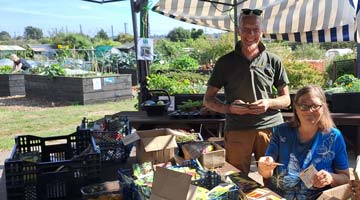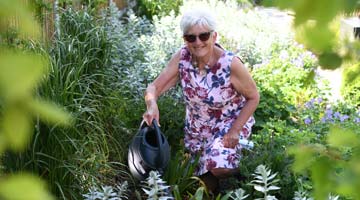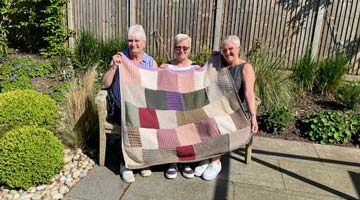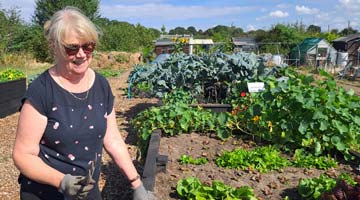Application Guidelines
We manage more than 130 different funds and our role is to assess and match applications to funders. We award grants to voluntary, community, faith and social enterprise (VCFSE) organisations and build trusted partnerships with individuals, businesses, trusts and foundations and the public sector to deliver sustainable funding for their work.
Since 2005, Suffolk Community Foundation has awarded 10,900 grants, totalling £43m across 3,346 local charities and community groups.
Use our step-by-step guide to explain this process, including whether you are eligible to receive a grant, how to apply, and how funding decisions are made.
Follow our step-by-step guide
We strive to be an open and trusting grantmaker and have signed up for the eight IVAR grantmaking principles. Read more about our eight open and trusting grant-making commitments.
Whether this is your first funding application or not, we are here to help you navigate our grants process and ensure that the funding we provide makes the biggest difference in local communities.
Our step-by-step guide will help you check your eligibility, apply, and understand how funding decisions are made.
If this is not your first application to the Foundation, please feel free to go straight to our Grants Available page.
Still unsure? Take our quick eligibility quiz first.

Step 1
Check your
eligibility
STEP 1
Check that your organisation’s structure qualifies for SCF funding
We provide grants to a variety of constituted voluntary and community organisations based in or actively operating in Suffolk.
Eligible groups include registered charities, charitable incorporated organisations, community interest companies, social enterprises, unincorporated associations, and community benefit societies. Funding is also available for community amateur sports clubs, churches, and faith organisations running inclusive activities that do not promote religious beliefs.
If you are a CIC or social enterprise please check that you meet our criteria before applying – click here to read
If unsure about your eligibility, take our eligibility quiz, book a meeting with one of our grants officers, email us at [email protected] or call us on 01473 602602 and ask to speak with a grants officer.

Step 2
Gather your
documents
STEP 2
Check that you meet SCF’s good governance requirements
To be eligible for funding, your group must meet the following requirements:
- Governing Document: A constitution or similar document outlining how your group is managed, states your charitable aims or community benefit, and includes a dissolution clause or in the case of a CIC, an Asset Lock. This does not apply to faith groups or parish/town councils.
- Governing Body: At least three unconnected individuals (not related by blood, marriage, long-term relationship, or shared address).
- Bank Account: An organisational bank account with at least two independent signatories. If you use electronic banking and your bank does not support online dual authority, we will need a copy of your Financial Controls Policy, confirming that you have additional internal financial controls in place to protect your organisation’s assets and meet your legal duties.
- Annual Accounts: You must provide end-of-year accounts. If these are over six month’s old, you must also submit current management accounts. These are regular financial reports, usually monthly or quarterly, showing your organisation’s financial position. They include Profit & Loss and Balance Sheet statements, helping management ensure that funds are properly managed and accounted for. We require evidence of your group’s income, expenditure, and unrestricted reserves. Generally, we do not fund organisations with reserves below 3-6 months or above 12 months of expenditure, depending on size.
- Bank Statement: A bank statement dated within the last three months, clearly displaying the group’s name, sort code, and account number. Personal information, such as names, should be redacted.
- Equality, Diversity and Inclusion: Your organisation must have an equality policy or statement that outlines its commitment to inclusivity and diversity for staff, volunteers, and service users. The policy should include a clear anti-discrimination statement and reference the protected groups defined in the Equality Act 2010.
- Safeguarding Policy and Procedure: The Foundation prioritises safeguarding and will not assess applications without a compliant safeguarding policy and procedures document. This must align with the latest legislation and reporting requirements in Suffolk. Your safeguarding policy should be clear and easily understood by anyone inside or outside your organisation. It must outline the necessary actions to take in case of a safeguarding concern. All organisations, regardless of whether they work directly with children or adults at risk, must have safeguarding policies covering staff, volunteers, and beneficiaries.
Required safeguarding policy contents:
-
- Policy statement
- Purpose
- Context
- Issue and review dates
- Details of the Designated Safeguarding Officer
Required safeguarding procedures contents:
-
- Recognising abuse and neglect
- Roles and responsibilities
- Responding to concerns
- Multi-agency sharing process
- Recording and safe storage procedures
- Allegations against staff, volunteers, or those in positions of trust
- Useful contacts
The policy and procedures should be reviewed annually, with the review date, next review date, and management committee approval recorded.
A safeguarding checklist is available here.
For support, Suffolk Community Foundation works with Community Action Suffolk, which provides resources and guidance. Contact Jacqui Wilkinson ([email protected]) for assistance.
Applications without a compliant safeguarding policy will not be assessed.

Step 3
Check that your
project is fundable
STEP 3
Check that your project is fundable
Our funds typically support activities that address a recognised need or disadvantage within a community. Funding is usually available for running/revenue costs, equipment, or modest capital expenses. Key examples of areas that we cannot fund (the list is not exhaustive):
- large capital projects where less than 70% of the total cost has already been raised
- equipment costing more than £5,000 unless part-funding can be evidenced
- personal/individual needs (with the exception of the Martineau Care Fund)
- direct replacement of statutory obligations e.g in education or the NHS
- sole traders or commercial ventures
- promotion of political or religious causes
- groups with significant unrestricted reserves
- national charities without local benefits
- retrospective grants
- fees for fundraisers or fundraising events
- start-up or legal costs, research, consultation or feasibility studies
- animal welfare unless it also benefits people (e.g disabled riding schemes)
- one-off cultural or celebratory events such as music, literary or arts festivals
- refreshment costs
- minibuses/other vehicles

Step 4
Applying
for a grant
STEP 4
Applying for a grant
Before applying, please read our full Terms and Conditions as you will be asked to confirm that you accept these when you submit your application.
Most of our funding comes from small, private funds, which are managed through our general application process. These are reviewed regularly, depending on the volume of applications and available funds. We also have a number of named funds listed on our website, each with its own criteria, application form, and deadline. If you are unable to find a specific fund that matches your project/services, please complete our general application form.
Our grants typically range from £2,000 to £5,000. You may apply for up to £5,000, unless a named fund mentions a different/higher amount. We will aim to submit your application to multiple funds to help maximise the amount awarded, but please note that neither full nor partial funding is guaranteed.
Your application will be read by our donors, so allow plenty of time to prepare it, make sure it is clear and concise, use plain language, avoid jargon, be specific about your goals, impact and project details, and ensure it is well-structured and easy to understand.
See our Top 10 Tips for Making a Great Application and read our AI Statement.
You will be asked to complete a Declaration when you submit your application confirming that you have read and agree to its contents, which include Authority, Terms and Conditions, Accuracy of Information, and Consent to Share.
Please sign up to receive our updates which will alert you to funds opening/closing soon and to new funding opportunities.
STEP 1
Check that your organisation’s structure qualifies for SCF funding
We provide grants to a variety of constituted voluntary and community organisations based in or actively operating in Suffolk.
Eligible groups include registered charities, charitable incorporated organisations, community interest companies, social enterprises, unincorporated associations, and community benefit societies. Funding is also available for community amateur sports clubs, churches, and faith organisations running inclusive activities that do not promote religious beliefs.
If you are a CIC or social enterprise, please check that you meet our CIC criteria before applying.
If you are unsure about your eligibility, take our eligibility quiz, book a meeting with one of our grants officers, email us at [email protected], or call us on 01473 602602 and ask to speak with a grants officer.
STEP 2
Check that you meet SCF’s good governance requirements
To be eligible for funding, your group must meet the following requirements:
- Governing Document: A constitution or similar document outlining how your group is managed, states your charitable aims or community benefit, and includes a dissolution clause or in the case of a CIC, an Asset Lock. This does not apply to faith groups or parish/town councils.
- Governing Body: At least three unconnected individuals (not related by blood, marriage, long-term relationship, or shared address).
- Bank Account: An organisational bank account with at least two independent signatories. If you use electronic banking and your bank does not support online dual authority, we will need a copy of your Financial Controls Policy, confirming that you have additional internal financial controls in place to protect your organisation’s assets and meet your legal duties.
- Annual Accounts: You must provide end-of-year accounts. If these are over six month’s old, you must also submit current management accounts. These are regular financial reports, usually monthly or quarterly, showing your organisation’s financial position. They include Profit & Loss and Balance Sheet statements, helping management ensure that funds are properly managed and accounted for. We require evidence of your group’s income, expenditure, and unrestricted reserves. Generally, we do not fund organisations with reserves below 3-6 months or above 12 months of expenditure, depending on size.
- Bank Statement: A bank statement dated within the last three months, clearly displaying the group’s name, sort code, and account number. Personal information, such as names, should be redacted.
- Equality, Diversity and Inclusion: Your organisation must have an equality policy or statement that outlines its commitment to inclusivity and diversity for staff, volunteers, and service users. The policy should include a clear anti-discrimination statement and reference the protected groups defined in the Equality Act 2010.
- Safeguarding Policy and Procedure: The Foundation prioritises safeguarding and will not assess applications without a compliant safeguarding policy and procedures document. This must align with the latest legislation and reporting requirements in Suffolk. Your safeguarding policy should be clear and easily understood by anyone inside or outside your organisation. It must outline the necessary actions to take in case of a safeguarding concern. All organisations, regardless of whether they work directly with children or adults at risk, must have safeguarding policies covering staff, volunteers, and beneficiaries.
Required safeguarding policy contents:
-
- Policy statement
- Purpose
- Context
- Issue and review dates
- Details of the Designated Safeguarding Officer
Required safeguarding procedures contents:
-
- Recognising abuse and neglect
- Roles and responsibilities
- Responding to concerns
- Multi-agency sharing process
- Recording and safe storage procedures
- Allegations against staff, volunteers, or those in positions of trust
- Useful contacts
The policy and procedures should be reviewed annually, with the review date, next review date, and management committee approval recorded.
The safeguarding checklist is available.
For support, Suffolk Community Foundation works with Community Action Suffolk, which provides resources and guidance. Contact Jacqui Wilkinson ([email protected]) for assistance.
Applications without a compliant safeguarding policy will not be assessed.
STEP 3
Check that your project is fundable
Our funds typically support activities that address a recognised need or disadvantage within a community. Funding is usually available for running/revenue costs, equipment, or modest capital expenses. Key examples of areas that we cannot fund (the list is not exhaustive):
- large capital projects where less than 70% of the total cost has already been raised
- equipment costing more than £5,000 unless part-funding can be evidenced
- personal/individual needs (with the exception of the Martineau Care Fund)
- direct replacement of statutory obligations e.g in education or the NHS
- sole traders or commercial ventures
- promotion of political or religious causes
- groups with significant unrestricted reserves
- national charities without local benefits
- retrospective grants
- fees for fundraisers or fundraising events
- start-up or legal costs, research, consultation or feasibility studies
- animal welfare unless it also benefits people (e.g disabled riding schemes)
- one-off cultural or celebratory events such as music, literary or arts festivals
- refreshment costs
- minibuses/other vehicles
STEP 4
Applying for a grant
Before applying, please read our full Terms and Conditions as you will be asked to confirm that you accept these when you submit your application.
Most of our funding comes from small, private funds, which are managed through our general application process. These are reviewed regularly, depending on the volume of applications and available funds. We also have a number of named funds listed on our website, each with its own criteria, application form, and deadline. If you are unable to find a specific fund that matches your project/services, please complete our general application form.
Our grants typically range from £2,000 to £5,000. You may apply for up to £5,000, unless a named fund mentions a different/higher amount. We will aim to submit your application to multiple funds to help maximise the amount awarded, but please note that neither full nor partial funding is guaranteed.
Your application will be read by our donors, so allow plenty of time to prepare it, make sure it is clear and concise, use plain language, avoid jargon, be specific about your goals, impact and project details, and ensure it is well-structured and easy to understand.
See our Top 10 Tips for Making a Great Application and read our AI Statement.
You will be asked to complete a Declaration when you submit your application confirming that you have read and agree to its contents, which include Authority, Terms and Conditions, Accuracy of Information, and Consent to Share.
Please sign up to receive our updates which will alert you to funds opening/closing soon and to new funding opportunities.

Step 5
Assessment of
Applications
STEP 5
Assessment of Applications
We regularly review applications and will only proceed with those that meet the Foundation’s funding criteria, the specific fund criteria (where relevant) and include all the required documents. If your application is withdrawn at this stage, you will be notified by email with an explanation.
You may be able to reapply at a later stage if you can provide all the necessary documents or refine your application to better align with a fund’s criteria and outcomes.
The grants team will conduct a full assessment of your application and complete due diligence checks, during which time you may be contacted or a meeting requested for further information.
You will usually receive a decision about your application within 12 weeks, though this may vary. To maximise funding, we may submit your application to multiple funds. Please contact the grants team if you need specific details about your application.

Step 6
Decision-making
process
STEP 6
Decision-making process
Our donors play an active role in the decision making process, whether through a grants panel meeting or with family members. Final decisions are taken by them. Applications that closely align with a fund’s criteria and expected outcomes are usually prioritised, although with many funds oversubscribed, some qualifying applications may still be unsuccessful.
Once a decision has been made, an offer email will be sent to successful applicants. All unsuccessful applicants will also be informed by email.
The grants team may submit your application to multiple funds, which means you could receive several grants small from your initial application.

Step 7
Release of the
grant
STEP 7
Release of the grant
Providing there are no outstanding conditions, payment of the grant will be made via BACS as soon as possible after the grants panel. The panel may in some circumstances make payment subject to certain conditions (e.g. project visit) or require that the grant be paid in stages, with payments being made on receipt of a satisfactory interim monitoring report.
Links to the End of Grant Monitoring forms are provided at the time of the award, so applicants should familiarise themselves with the requirements before starting project delivery.

Step 8
Monitoring and
Impact
STEP 8
Monitoring and Impact
We monitor and assess successful applicants to ensure that funds are used correctly.
For grants of £5,000 and under, funded groups will receive a link to a short online End of Grant Monitoring Form to complete at the end of the grant period, typically 12 months after the grant is paid. We may also request a visit to assess the progress and impact of the grant. The report will need to include benchmarking of the beneficiaries at the beginning and end of the project/service, i.e. how were they referred to the project/service, what change has happened.
Evidence could be from a range of sources appropriate to this project e.g user logs, surveys, feedback forms, formal or informal interviews, focus or steering groups, volunteer observations, recorded discussions, tracking or tracing logs etc. It will also need to include a case study – for information about case studies, please read our How to Write a Good Case Study Guide and our Monitoring & Evaluation Fact Sheet. Grants exceeding £5,000 may require more detailed monitoring, particularly if awarded by public sector funders such as the NHS, SCC, or the PCC. You will be informed of the monitoring requirements when the grant is awarded.
Funder visits may also be requested during the lifetime of any grant.
STEP 5
Assessment of Applications
We regularly review applications and will only proceed with those that meet the Foundation’s funding criteria, the specific fund criteria (where relevant) and include all the required documents. If your application is withdrawn at this stage, you will be notified by email with an explanation.
You may be able to reapply at a later stage if you can provide all the necessary documents or refine your application to better align with a fund’s criteria and outcomes.
The grants team will conduct a full assessment of your application and complete due diligence checks, during which time you may be contacted or a meeting requested for further information.
You will usually receive a decision about your application within 12 weeks, though this may vary. To maximise funding, we may submit your application to multiple funds. Please contact the grants team if you need specific details about your application.
STEP 6
Decision-making process
Our donors play an active role in the decision making process, whether through a grants panel meeting or with family members. Final decisions are taken by them. Applications that closely align with a fund’s criteria and expected outcomes are usually prioritised, although with many funds oversubscribed, some qualifying applications may still be unsuccessful.
Once a decision has been made, an offer email will be sent to successful applicants. All unsuccessful applicants will also be informed by email.
The grants team may submit your application to multiple funds, which means you could receive several small grants from your initial application.
STEP 7
Release of the grant
Providing there are no outstanding conditions, payment of the grant will be made via BACS as soon as possible after the grants panel. The panel may in some circumstances make payment subject to certain conditions (e.g. project visit) or require that the grant be paid in stages, with payments being made on receipt of a satisfactory interim monitoring report.
Links to the End of Grant Monitoring forms are provided at the time of the award, so applicants should familiarise themselves with the requirements before starting project delivery.
STEP 8
Monitoring and Impact
We monitor and assess successful applicants to ensure that funds are used correctly.
For grants of £5,000 and under, funded groups will receive a link to a short online End of Grant Monitoring Form to complete at the end of the grant period, typically 12 months after the grant is paid. We may also request a visit to assess the progress and impact of the grant. The report will need to include benchmarking of the beneficiaries at the beginning and end of the project/service, i.e. how were they referred to the project/service, what change has happened.
Evidence could be from a range of sources appropriate to this project e.g user logs, surveys, feedback forms, formal or informal interviews, focus or steering groups, volunteer observations, recorded discussions, tracking or tracing logs etc. It will also need to include a case study – for information about case studies, please read our How to Write a Good Case Study Guide and our Monitoring & Evaluation Fact Sheet. Grants exceeding £5,000 may require more detailed monitoring, particularly if awarded by public sector funders such as the NHS, SCC, or the PCC. You will be informed of the monitoring requirements when the grant is awarded.
Funder visits may also be requested during the lifetime of any grant.
Contact Us
Please feel free to contact the grants team at any stage of your application for more help or support.
T. 01473 602602
E. [email protected]
If you need further support with your application, you can book a meeting with one of our Grants Officers.
Available Grants
Now you know the process, click the button below to learn more about available funds and how they provide vital support to those living and working in Suffolk
